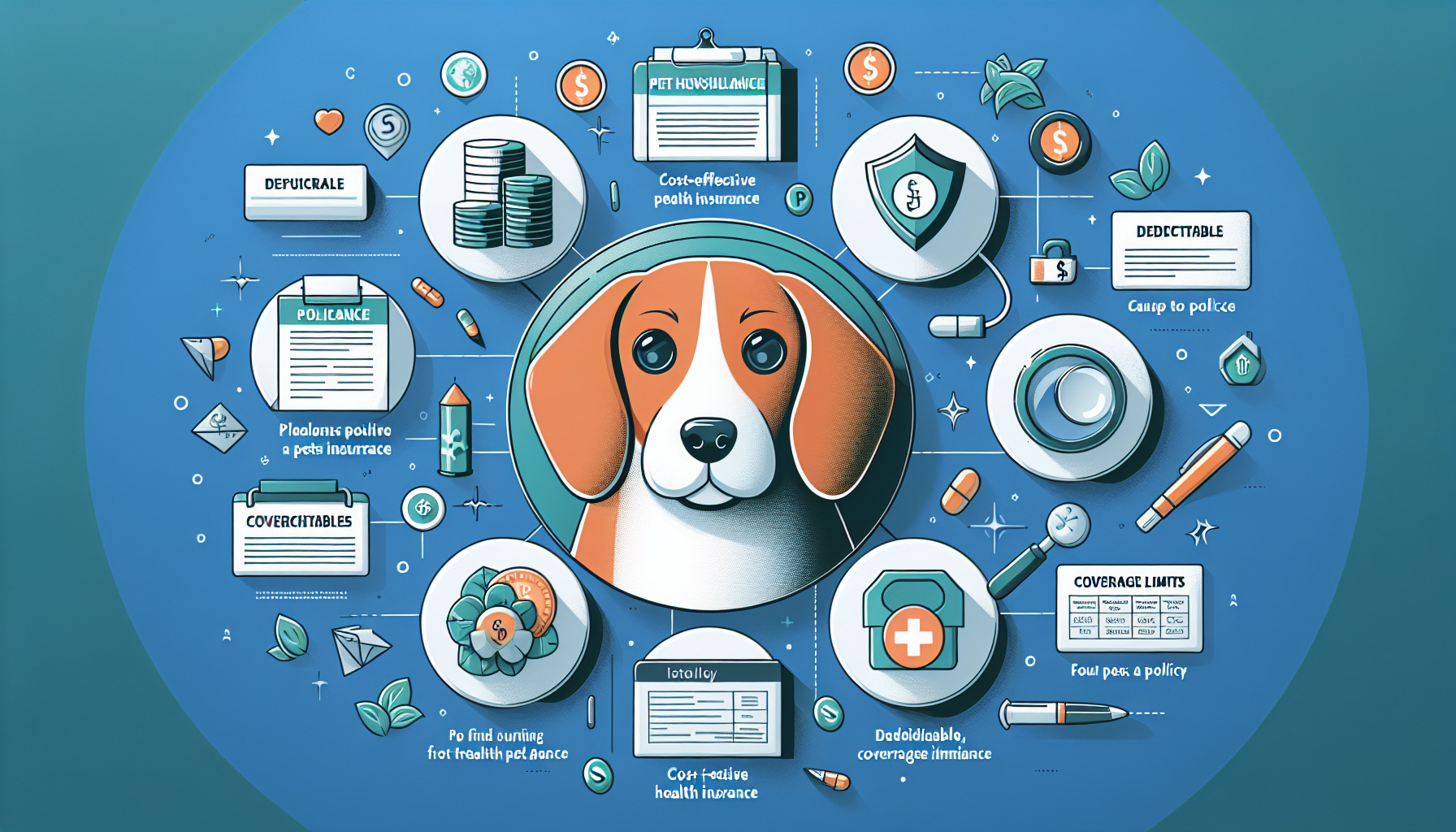If you have a furry friend in your life, you know how much joy and happiness they bring. But just like humans, pets can face unexpected health issues that can lead to hefty vet bills. That’s where pet health insurance comes in. In this article, we will explore the best methods to find cost-effective pet health insurance that provides the coverage your beloved companion needs, without breaking the bank. So, let’s dive into the world of pet insurance and ensure your furry friend receives the care they deserve, without sacrificing your wallet.

Understanding the Importance of Pet Health Insurance
Owning a pet brings immense joy and companionship into your life, but it also comes with the responsibility of ensuring their well-being. One crucial aspect of pet care that often gets overlooked is securing reliable health insurance for your furry friend. Just like humans, animals can fall ill or suffer from accidents, and the costs of veterinary care can quickly add up. That’s where pet health insurance comes in – it provides financial protection and peace of mind, allowing you to prioritize your pet’s health without breaking the bank.
Why pet health insurance is necessary
When it comes to your pet’s health, unforeseen circumstances can arise at any time. From sudden illnesses to unexpected accidents, your pet’s well-being can require immediate medical attention that can be expensive. Pet health insurance helps you manage these costs by covering a portion of veterinary bills, ensuring you can provide the best possible care for your furry companion. It also allows you to make decisions based on the best interest of your pet, rather than solely on the financial implications.
The benefits of having pet health insurance
Having pet health insurance offers numerous benefits that go beyond financial assistance. Firstly, it provides you with peace of mind knowing that, in case of an emergency or illness, you won’t have to worry about the financial burden of treatment. This peace of mind extends to your pet as well, as they can receive the necessary care promptly, without hesitation. Additionally, pet insurance often includes preventive treatments, wellness check-ups, and routine care, allowing you to take a proactive approach to your pet’s health.
Cost-saving potential of pet health insurance
One of the key advantages of pet health insurance is the potential for significant cost savings. Veterinary bills can quickly accumulate, especially if your pet requires long-term care or specialized treatments. With insurance coverage, you can avoid the financial strain of unexpected medical expenses. By paying a monthly premium, you can spread out the costs and receive reimbursement for eligible expenses. This cost-saving potential not only benefits your bank account but also ensures that your pet can receive the care they need without compromise.
Researching Different Pet Health Insurance Providers
With the understanding of the importance of pet health insurance, it’s essential to research and select a reliable provider that meets your needs. Here are some important factors to consider when exploring different pet health insurance options.
Popular pet health insurance providers
Start by exploring reputable pet health insurance providers in the market. Companies such as PetFirst, ASPCA, Trupanion, and Embrace Pet Insurance have established themselves as reliable choices. These providers have a proven track record of excellent customer service, comprehensive coverage, and fair reimbursement policies.
Comparing coverage options
Once you have narrowed down your list of potential providers, it’s crucial to compare the coverage options they offer. Look for policies that include a broad range of services, including accident and illness coverage, preventive care, medication, and even alternative therapies. Ensure that the coverage aligns with your pet’s specific needs and any pre-existing conditions they may have.
Examining customer reviews and experiences
To gain further insight into each pet health insurance provider, reading customer reviews and experiences can be incredibly valuable. Look for opinions and feedback from pet owners who have utilized the insurance policies in real-life situations. Pay close attention to factors such as claim processing time, reimbursement rates, and overall customer satisfaction. A provider that consistently receives positive reviews from satisfied customers is more likely to be a reliable choice.
Evaluating Coverage Options
Once you have narrowed down your list of potential providers, it’s time to evaluate the coverage options they offer. Consider the following factors to ensure you select the right coverage for your pet’s specific needs.
Types of coverage available
Pet health insurance policies generally offer two types of coverage: accident-only coverage and comprehensive coverage. Accident-only coverage focuses solely on accidents and injuries, while comprehensive coverage includes both accidents and illnesses. Consider your pet’s age, breed, and overall health when deciding which type of coverage is most suitable.
Considerations for your pet’s specific needs
Every pet is unique, and their healthcare needs can vary significantly. Some pets may have pre-existing conditions, while others may be more prone to specific illnesses or injuries. It’s essential to choose a health insurance policy that adequately addresses your pet’s specific needs, including coverage for hereditary or breed-specific conditions.
Looking into pre-existing conditions
Keep in mind that most pet health insurance policies do not cover pre-existing conditions. These are any illnesses or injuries that existed before the policy was purchased. If your pet has a pre-existing condition, carefully review each provider’s policy on coverage for these conditions. Some providers may exclude them entirely, while others may offer limited coverage after a waiting period.
Assessing Cost Factors
While pet health insurance offers financial protection, it’s important to understand the various cost factors involved in selecting the right coverage for your pet.
Premiums and deductibles
The premium is the monthly or annual amount you pay for your pet’s insurance coverage. Consider your budget and choose a premium that is affordable for you. Additionally, understand the deductible – the amount you are responsible for paying before the insurance coverage kicks in. Higher deductibles often result in lower premiums but ensure you can comfortably afford the deductible should an emergency occur.
Co-pays and additional fees
In addition to premiums and deductibles, be aware of any co-pays or additional fees associated with the policy. Co-pays are the portion of the veterinary bill you are responsible for paying, while additional fees may include administrative or processing charges. Consider these factors when comparing different policies to find the most cost-effective option.
Lifetime and annual limits
Some pet health insurance policies impose lifetime or annual limits on the amount they will reimburse. Lifetime limits restrict the total amount the provider will pay for your pet’s care over their lifetime, while annual limits cap the reimbursement amount per year. Consider your pet’s potential healthcare needs and opt for a policy with appropriate limits to ensure sufficient coverage.

Understanding Exclusions and Limitations
While pet health insurance provides valuable coverage, it’s crucial to understand the exclusions and limitations within each policy.
Common exclusions in pet health insurance policies
Pet health insurance policies often contain exclusions, which are specific conditions or situations that are not covered. Common exclusions include pre-existing conditions, hereditary conditions, elective procedures, and behavioral problems. Carefully review the policy to understand what exclusions may apply to your pet.
Coverage restrictions based on breed or age
Some pet health insurance providers may impose additional restrictions based on your pet’s breed or age. Certain breeds may be more prone to specific health conditions, making them higher risk for the insurance company. Similarly, older pets may face limitations on certain coverage options. Ensure you are aware of any breed or age-related restrictions before selecting a policy.
In-depth examination of policy fine print
Reading the fine print of your chosen pet health insurance policy is essential to fully understand the coverage, limitations, and any hidden clauses. Look for details such as waiting periods before coverage begins, policy renewability, and how pre-existing conditions are defined. Understanding these details will help you make an informed decision and avoid any surprises in the future.
Considerations for Multiple Pets
If you own multiple pets, it’s important to consider their unique needs when selecting pet health insurance.
Discounts or multi-pet policies
Some pet health insurance providers offer discounts for insuring multiple pets. This can make it more affordable to provide comprehensive coverage for all of your furry companions. Look for providers that offer multi-pet policies or discounts to simplify the insurance process and save on premiums.
Coverage customization for each pet
Each of your pets may have different healthcare needs, depending on their age, breed, and pre-existing conditions. Consider selecting a policy that allows you to customize coverage for each individual pet, ensuring they receive the specific attention and protection they require.
Vet network considerations for multiple pets
Another factor to consider when insuring multiple pets is the vet network offered by the insurance provider. Ensure that the network of participating veterinarians is convenient and accessible for all of your pets. Having a wide range of options will provide flexibility and convenience when seeking medical care for your pets.
Utilizing Pet Health Insurance Complementary Benefits
Some pet health insurance policies offer complementary benefits that go beyond basic coverage. These benefits can further enhance the level of care you can provide for your pet.
Wellness and routine care coverage
Some insurance providers include coverage for routine check-ups, vaccinations, and preventive care. This coverage allows you to proactively maintain your pet’s health and catch any potential issues early on. Preventive care coverage can save you money in the long run by addressing minor health concerns before they become major problems.
Prescription medication coverage
Pet health insurance may also include coverage for prescription medications. This is particularly valuable if your pet requires long-term medication for chronic conditions or ongoing treatment. Having financial assistance for these medications can significantly reduce the overall cost of care.
Alternative therapies and specialized treatments
Certain pet health insurance policies may offer coverage for alternative therapies or specialized treatments. These can include acupuncture, physical therapy, or even experimental treatments. If you believe that such treatments could benefit your pet, consider selecting a policy that offers coverage for these additional options.
Exploring Discounts and Promotions
When researching pet health insurance options, it’s worth looking into any discounts or promotions that can further reduce your costs.
Introductory discounts for new customers
Many pet health insurance providers offer introductory discounts for new customers. These discounts can be a great way to get started and ensure that pet health insurance is a cost-effective option for your needs. Take advantage of these promotions to reduce your initial expenses.
Membership or loyalty rewards
Some pet health insurance providers offer membership or loyalty programs that come with additional rewards or benefits. These can include discounts on pet supplies, access to specialized services, or even reimbursement for certain preventive treatments. Consider these programs to maximize your savings and overall value from your pet health insurance provider.
Group or employer-sponsored plans
Inquire about group or employer-sponsored pet health insurance plans that may be available to you. These plans often come with discounted rates or additional benefits. Check if your workplace offers this perk or if you belong to any groups or organizations that have such coverage options.
Considering Customer Service and Claims Process
As you narrow down your choices, consider the quality of customer service and the efficiency of the claims process provided by each pet health insurance provider.
Customer service reputation of providers
A reliable and responsive customer service team is crucial when it comes to navigating the pet health insurance process. Look for providers that have a reputation for excellent customer service, prompt responses, and clear communication. This will ensure a smooth experience when seeking assistance or filing claims.
Claim submission and reimbursement process
Understanding how the claim submission and reimbursement process works is essential for a stress-free experience. Look for providers that offer convenient options for claim submission, such as online portals or mobile apps. Additionally, consider the average reimbursement time and the provider’s track record for timely payouts.
Access to online tools and support
In the digital age, online tools and support can greatly enhance your pet health insurance experience. Look for providers that offer access to online portals where you can manage your policy, submit claims, and track reimbursement status. Online resources, such as educational materials or FAQs, can also be valuable for answering any questions you may have.
Seeking Advice from Veterinary Professionals
While conducting your research, it’s beneficial to seek advice and recommendations from veterinary professionals.
Consulting your veterinarian’s recommendations
Your veterinarian is an invaluable source of information and insight when it comes to pet health insurance. They have first-hand experience dealing with various insurance providers and can provide recommendations based on their knowledge of your pet’s specific healthcare needs. Consult with your veterinarian to understand which providers they trust and any coverage options they recommend.
Veterinary associations and resources
Veterinary associations often offer resources and guidance on pet health insurance. They may have lists or directories of recommended providers that adhere to their professional standards. Consult these associations to access reputable pet health insurance providers within your region.
Seeking opinions from pet owners in your circle
Lastly, don’t hesitate to seek opinions from fellow pet owners in your network. Hearing firsthand experiences and recommendations from others who have gone through the process can provide valuable insights. Speak to friends, family, or even online pet communities to gather diverse perspectives on different pet health insurance providers.
By following these steps and carefully considering your pet’s unique needs, you can find cost-effective pet health insurance that offers the coverage and peace of mind you and your furry friend deserve. Remember, investing in your pet’s health today can lead to a healthier and happier future together.

